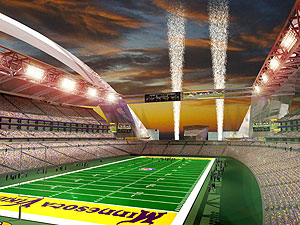Stadium bill on fast track, critics contend
March 30, 2004
 |
| An artist rendering of the view at a Vikings stadium from the luxury suites. (Minnesota Vikings) |
St. Paul, Minn. — The stadium plan prompted nearly eight hours of debate, testimony, and pointed questions during its first foray into the legislative process last week. By contrast, Monday's discussion wrapped up in just over an hour, and committee members focused mainly on the creation of a Minnesota Stadium Authority that would hammer out most of the as-yet-unspecified financial details.
The proposed authority was expanded to include four legislatively-appointed members in addition to seven chosen by the governor. But the committee also rejected an amendment that would have required the teams to provide one-third of the construction costs up-front and in cash.
Republican Carl Jacobson of Vadnais Heights says he's disappointed the committee defeated his proposal.
|
I think it's a perfectly awful bill... But because the governor's behind it and the speaker wants it, they're going to do whatever they have to to manipulate the process to make this happen.
- Rep. Carl Jacobson, R-Vadnais Heights |
"It forces the teams to commit very early and in a very solid way. The way the bill is written, we could see any number of scams and shellgames done where there could very well be no money from the teams at all -- which, obviously, is exactly what the teams want to see," he said.
The two stadiums combined are expected to cost more than $1 billion, and the state and local governments are expected to meet two-thirds of that commitment. The teams would cover the remaining third, but they're given significant flexibility on how to do so. Contributions, for example, could be spread over the life of their leases. And since cash-in-hand is generally considered more valuable than future payments, some critics worry that complicated financial agreements could lighten the teams' loads.
Twins Sports President Jerry Bell, however, dismisses those concerns as "nonsense." Bell argues that Major League Baseball's rules on accounting and team indebtedness favor spreading payments over time. He says an upfront requirement would kill the deal.
"If we had to make an up-front, in-cash, one-third contribution, we're done. We can't afford to do that and provide a competitive team," according to Bell.
A majority of committee members agreed. Republican Steve Strachan of Farmington argues that the proposed stadium authority should have as much leeway as possible to strike a deal that meets the interests of the state, the local host community, and the teams.
"The goal here is to allow the authority and the teams some level of flexibility and the ability to negotiate," he said.
Vikings consultant Lester Bagley also called for keeping all options open. He notes that the Vikings in particular are still not sure if the plan will work, and he says making it more restrictive won't help. The benefit of the new proposal, he says, is precisely that it allows for a neutral authority to negotiate financial terms, away from the political heat of the Legislature.
"Some of those objections are not very well founded because... they're based on stadium discussions of the past. This is a whole different stadium bill, and one that I think does protect the public," Bagley says.
The committee did strengthen a provision meant to capture for the public any increase in team value that's attributable to government stadium subsidies. Previously, the bill called for the authority only to ask for such a capture. It would now be required, and teams would have to open their financial books to help establish their worth. Both the Twins and the Vikings say they need time to study the change to understand its implications.
Opponents of the bill, however, were clearly not impressed by what they saw. The plan moved ahead without a formal endorsement, and without a recorded roll call vote.
Jacobson says that's a sign that Gov. Tim Pawlenty and House Speaker Steve Sviggum are exerting pressure to keep the plan alive.
"The skids have been greased for the bill. I think it's a perfectly awful bill, probably the worst stadium bill we've ever had. But because the governor's behind it and the speaker wants it, they're going to do whatever they have to to manipulate the process to make this happen," he said.
Both Pawlenty and Sviggum are vocal supporters of the plan. But both say stadium legislation is not a top priority. The proposal now moves to the House Taxes Committee where more pointed financial questions are likely. The DFL-controlled Senate has not yet taken action on stadium legislation.
|
News Headlines
|
Related Subjects
|

